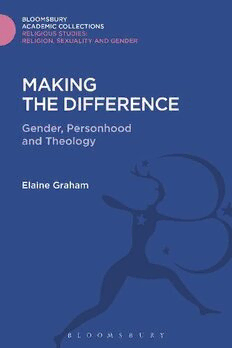
Making the Difference: Gender, Personhood and Theology PDF
274 Pages·1995·26.65 MB·English
Most books are stored in the elastic cloud where traffic is expensive. For this reason, we have a limit on daily download.
Preview Making the Difference: Gender, Personhood and Theology
Description:
One of the most significant phenomena within the Western church in the second half of the twentieth century has been the emergence of feminist theology. This both reflects and promotes pastoral and policy concerns about the proper roles and relationships of women and men within the Christian church, such as the validity of women’s priestly ministry, the use of inclusive language in liturgy and the metaphorical naming of God. At the heart of the debate is the question of the meaning and significance of gender in theology and Christian practice.Within the human and social sciences, the analysis of gender is treated as an essential aspect of human behaviour. By contrast, within the church there has been little sustained or disciplined attention to the nature and underlying significance of gender. Theological discourse and church policy have too often displayed ignorance and unexamined assumptions about the crucial issues involved. Graham attempts a more detailed and critical inquiry into how an analysis of gender can affect policy, practice and discourse within the church. Focusing on three major disciplines – anthropology, biology and psychoanalysis – she demonstrates how these offer profound implications for our understanding of the foundations of human culture and identity, for theological studies and for Christian practice.
See more
The list of books you might like
Most books are stored in the elastic cloud where traffic is expensive. For this reason, we have a limit on daily download.
